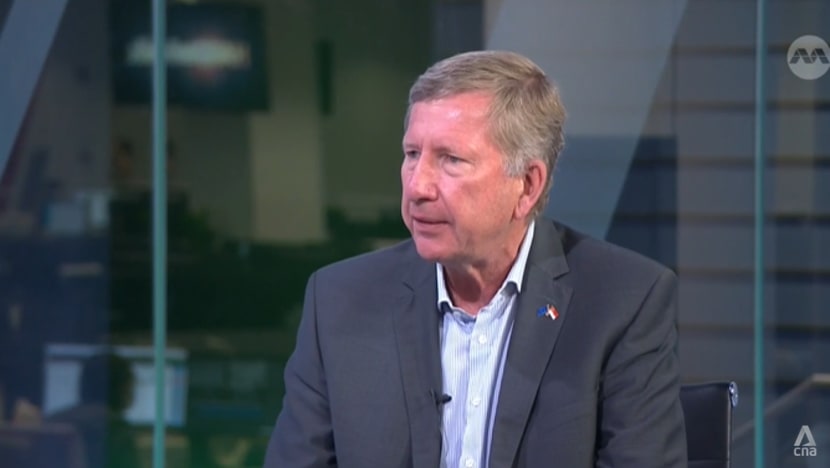Is monitoring the wastewater of planes the way to prepare for the next health crisis?
Getting out of the COVID-19 pandemic was a global effort, and the world has to work together again to prepare for the next health crisis, said the European Commission’s director-general for Health Emergency Preparedness and Response.

Director-general for Health Emergency Preparedness and Response (HERA) Pierre Delsaux speaking to CNA's Asia Now in studio on Tuesday (Apr 18).
SINGAPORE: Monitoring the wastewater of planes could be a “good tool” to try to find out whether a new virus is arriving in a country, the European Commission’s director-general for Health Emergency Preparedness and Response (HERA) Pierre Delsaux said on Tuesday (Apr 18).
Such surveillance is a simple example of how countries can cooperate to prepare for future health crises, which could be very important, said Mr Delsaux.
“We believe it's important that we try to build concrete projects of cooperation,” he told CNA’s Asia Now.
“We are willing to try to work with other parts of the world to try to develop this kind of technology,” added Mr Delsaux, who is in Singapore for discussions with health officials here.
He called Singapore a door to other Asian countries, stressing the importance of the world working together to solve health problems.
“We live in a global world. So, something which is happening in one part of the world can have an influence everywhere in the world … something we cannot ignore,” he said when asked for the biggest takeaway from the pandemic.
Getting out of the COVID-19 pandemic was a global effort, he noted.
“This is also a very important lesson for the future. We need to continue this work collectively … to try to address future crises,” he said.
He added that when the pandemic struck, nobody was ready for such a crisis, a situation “we need to be aware of”.
NEED FOR PREPARATION
When asked how the European Union prioritises financial commitments given the ongoing war in Ukraine, Mr Delsaux said that while the impact of the war has to be addressed, the cost of a health crisis is “huge”.
“We know one thing for sure - there will be a new health crisis in the future. We don't know when exactly, but there will be one,” he said.
“So we need to continue the preparation. We need to continue to invest in health security because that would be important one day.”
To be better prepared for the next crisis, the European Commission, the EU's politically independent executive arm, has a budget of more than €1 billion (US$1.1 billion) a year, he said.
Part of the budget will be used to drive research for new vaccines, therapeutics, and whatever may be needed, he said.
However, Mr Delsaux said it is “extremely important” that his team’s work is not done in isolation.
“If we want to find the solution … We need to work collectively. We need to work with the rest of the world,” he said.
“Our vision is simply, we don't want to protect Europe, we want to protect the world because by protecting the world, we protect Europe too.”
EUROPE’S COVID-19 PANDEMIC RESPONSE
Responding to criticism that the EU was fragmented and slow to respond to the pandemic, Mr Delsaux defended the bloc by citing facts and numbers.
While the countries may have been lacking in communication, vaccines were available in Europe at the same time as other parts of the world, with 27 countries cooperating to decide to purchase them, he said.
“There was never a selfish attitude from those member states. Everybody was also willing to share those vaccines with the rest of the world,” he said, adding that they were buying vaccines for the global community as well.
Addressing inequality in the access to the COVID-19 vaccine between rich and poor countries, Mr Delsaux highlighted that the EU produced more than 3 billion vaccines during the crisis, with two-thirds of them exported outside of the bloc.
More than 1 billion vaccines were exported to the Asia-Pacific region, he noted.
The EU countries and the European Commission distributed more than 500 million vaccines to poor countries, he said.
The largest funding to the COVID-19 Vaccine Global Access (COVAX) initiative also came from the EU, totalling more than €4 billion, he added.
COVAX is a worldwide initiative working to ensure fair, equitable access to vaccines for every country that participates in it.
“We have been the largest donors of vaccines from all the richest countries. And that's something which is not necessarily so well known,” said Mr Delsaux.
















